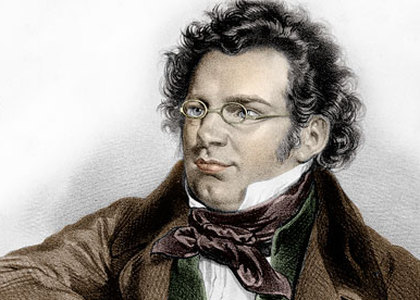> [Archived] Recommendations

Franz Schubert - the Composer of the Week on Arpeggio, between 26-30th January, 2015
Franz Peter Schubert's life can be seen as an icon of the Romantic neglected genius who faded into obscurity, as his accomplishments have been acknowledged worldwide only after his death. He was one of the first figures of the Romantic movement, and he also developed the lied more than any other composer after reaching his artistic maturity. During his short, but very prolific life, Schubert created several masterpieces belonging to almost every musical genre, all of them being richly harmonious and characterised by the expansion of the classical forms and, above all, by extraordinary melodic lines.
Beginings
The composer, who was born near Vienna, studied music with his father and brothers, and then he went to a seminar where young musicians were trained for the musical life of the Imperial Court. The director of the institution was Antonio Salieri, whose attention was drawn by one of little Schubert's works. In 1813, after his voice had changed, Schubert returned to his father's house who advised him to follow in his footsteps and become a teacher. Although unhappy about this job, the artist submitted, but he kept on composing at night. In this way, by the time he was 20, the catalogue of his opuses already contained over 100 lieder (the most well-known are Gretchen am Spinnrade and Erlkönig - both played on Goethe's lyrics), various symphonic and opera works, but also chamber music scores.
Futile efforts
In 1818 Schubert finally decided to dedicate his life to music exclusively, and during summer he worked as a music teacher for the aristocratic family Esterházy. When he quitted his job, during fall, Schubert started leading a bohemian life, composing and spending time with his friends, who appreciated and supported him. In 1820, Schubert was asked to write two operas (for Karthnerthor Theatre and Theatre-an-der-Wein), thus he wrote Zwillingsbruden and Zauberharfe - but neither of the two had any success among the audiences. As he had not signed a contract with an editor, Schubert published his own opuses for approximately 100 people with the help of his friends. His works drew little attention, as his fellow composers thought his music was immature.
Little signs of appreciation
In 1823 Schubert was chosen as an honorary member of Graz Music Society. Although it did not bring him any material benefits, and considering the inconstant activity it implied as well, Schubert enjoyed this small sign of appreciation and wrote the score known today as the Unfinished Symphony. Five years later Schubert's work was played in a performance of the Viennese Music Association. This was the only public success the composer had during his life and it gave him a note of optimism. He kept on writing incredibly fast, despite his poor health.
Posthumous recognition
Schubert did not get better (he had had sifilis since 1822) and he died on 19th November 1828 in the arms of Ferdinand, his brother. He was the one to make all the possible efforts to publish Schubert's music, but Robert Schumann was the one who, after having found the score of Schubert's Symphony No. 9 in 1835, wrote about the Austrian composer's genius and organised a grand premiere of the opus, thus opening the way for a complete reevaluation of Frank Schubert's works as well as for his worldwide recognition.
Franz Schubert is the Composer of the week every day from Monday to Friday, between 26-30th January 2015, at 12.00, on Arpeggio.
Translated by Ioana Săbău and Elena Daniela Radu
MTTLC, the University of Bucharest














